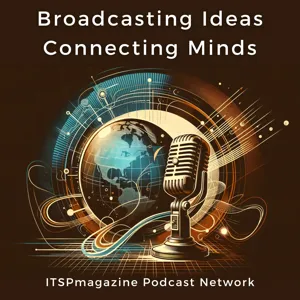Guest: Jean-Manuel Izaret, Author
On Linkedin | https://www.linkedin.com/in/izaret/
On Twitter | https://twitter.com/izaret
____________________________
Host: Marco Ciappelli, Co-Founder at ITSPmagazine [@ITSPmagazine] and Host of Redefining Society Podcast
On ITSPmagazine | https://www.itspmagazine.com/itspmagazine-podcast-radio-hosts/marco-ciappelli
_____________________________
This Episode’s Sponsors
BlackCloak 👉 https://itspm.ag/itspbcweb
Bugcrowd 👉 https://itspm.ag/itspbgcweb
Devo 👉 https://itspm.ag/itspdvweb
_____________________________
Episode Introduction
In a world where economic dynamics intricately intertwine with our daily lives, understanding the nuances of strategic pricing becomes imperative. This is the central theme of the latest episode of the "Redefining Society Podcast," where we engage in a thought-provoking conversation with Jean-Manuel Izaret, co-author of "Game Changer: How Strategic Pricing Shapes Businesses, Markets, and Society."
The episode begins with a reflection on the often-overlooked significance of pricing in technology and societal contexts. We question whether strategic pricing truly belongs in discussions about technology and its societal impact, only to discover its undeniable relevance. As Izaret points out, pricing strategies do more than just set the cost of goods and services; they shape consumer behavior, influence market trends, and even hold the power to dictate the course of society.
Izaret, with a rich background in economics and behavioral science, brings a unique perspective to the table. Drawing from his extensive experience in consulting and pricing strategy formulation, he discusses the evolution of pricing from a mere transactional element to a strategic tool capable of influencing societal outcomes. The concept of the Strategic Pricing Hexagon, introduced in the book, serves as a gateway to understanding how strategic decisions regarding pricing can lead to stronger growth and improved financial performance for businesses.
The conversation delves deeper into the psychological and sociological aspects of pricing. We explore how prices affect our purchasing decisions, the value we assign to products, and even our perception of brands. Izaret uses relatable examples, like the luxury branding of Gucci or the dynamics of the tipping culture, to illustrate these points. These examples highlight the complex relationship between pricing, consumer expectations, and societal norms.
Furthermore, the episode addresses the global impact of pricing strategies. In a world increasingly interconnected, a pricing decision in one part of the globe can have ripple effects elsewhere. This global perspective is crucial in understanding the role of strategic pricing in shaping not just local markets but the global economic landscape.
As the conversation unfolds, it becomes clear that strategic pricing is not just about numbers and profit margins. It's about understanding human behavior, societal values, and market dynamics. It's a tool that, when wielded wisely, can contribute to the greater good, promoting sustainable and equitable growth.
By the end of the episode, listeners are left with a newfound appreciation for the power of pricing. It's no longer a dry, technical topic relegated to economics textbooks. Instead, it emerges as a vibrant, dynamic field that intersects with technology, society, and human psychology, influencing our lives in profound ways.
📖 About the Book:
The right pricing strategy can change the entire trajectory of a business, a market, and even society at large. To help you create your best pricing strategy efficiently and confidently, two leaders from BCG are introducing fresh perspectives on pricing that take you far beyond the realm of mind-numbing numbers.
In their new book Game Changer: How Strategic Pricing Shapes Businesses, Markets, and Society, Jean-Manuel Izaret and Arnab Sinha simplify and clarify pricing strategy by integrating its many frameworks and concepts into seven distinct pricing games, each with its own proven tools, rules, forces, and structures. To help you pick the right game and play it well, Izaret and Sinha have developed the Strategic Pricing Hexagon, a tool refined through years of testing, iteration, and adaptation. The Hexagon is your portal to a business world where stronger growth and better financial performance come from a set of strategic pricing decisions, not endless myopic quests for optimal prices.
But more than that, the Hexagon will change the way you think about and talk about pricing. The current conversation around pricing – as expressed through economics textbooks, Excel spreadsheets, political discourse, and educated guesswork – makes it easy to believe that pricing is nothing more than a technical, tactical and, for most people, boring game of numbers. Game Changer changes that conversation bysharing stories and research that bring the Hexagon and its seven pricing games to life.
With research from BCG’s Bruce Henderson Institute and real-world examples from the world's most influential companies, the authors and their colleagues at BCG define pricing strategy as a business leader’s or business owner’s conscious decisions about how money flows in their market. They show how companies succeed in the long term when they focus on collaborative growth and value sharing with customers, not zero-sum value extraction from them.
Discover how you can create and implement a winning pricing strategy that changes the trajectory of your business, your market, and even society.
_____________________________
Resources
Game Changer: How Strategic Pricing Shapes Businesses, Markets and Society: https://www.amazon.com/Game-Changer-Strategic-Pricing-Business/dp/1394190581#:~:text=%E2%80%9CGame%20Changer%20elevates%20pricing%20from,%2Dto%2Dmarket%20strategies.%E2%80%9D
____________________________
To see and hear more Redefining Society stories on ITSPmagazine, visit:
https://www.itspmagazine.com/redefining-society-podcast
Watch the webcast version on-demand on YouTube: https://www.youtube.com/playlist?list=PLnYu0psdcllTUoWMGGQHlGVZA575VtGr9
Are you interested in sponsoring an ITSPmagazine Channel?
👉 https://www.itspmagazine.com/advertise-on-itspmagazine-podcast






![[Greatest Hits] Why Behavioral Economics is More Than the Future of Businesses with Melina Palmer, Founder and CEO of The Brainy Business](https://www.podcastworld.io/podcast-images/getting-to-aha-with-darshan-mehta-bg8e1ejo.webp)








